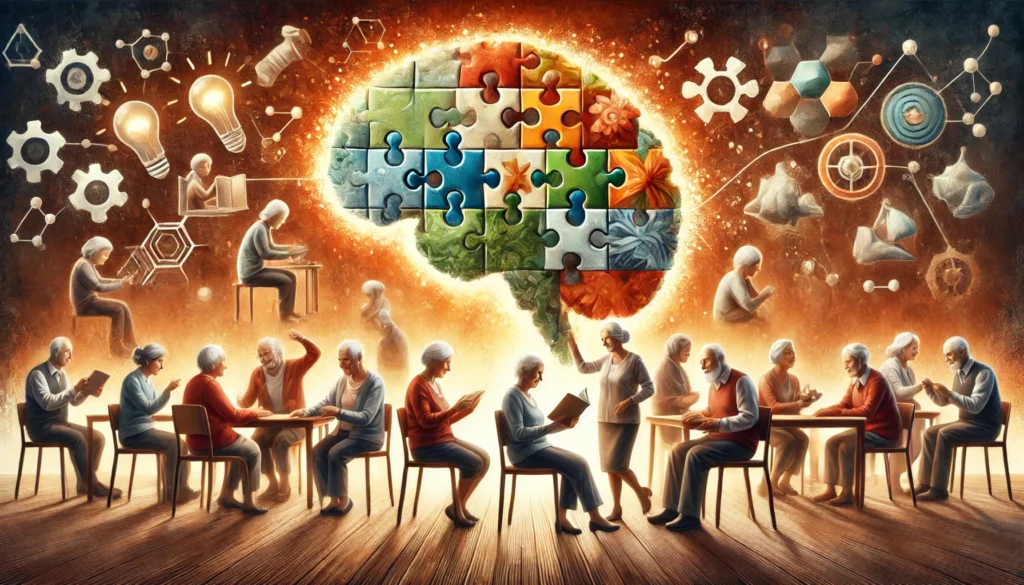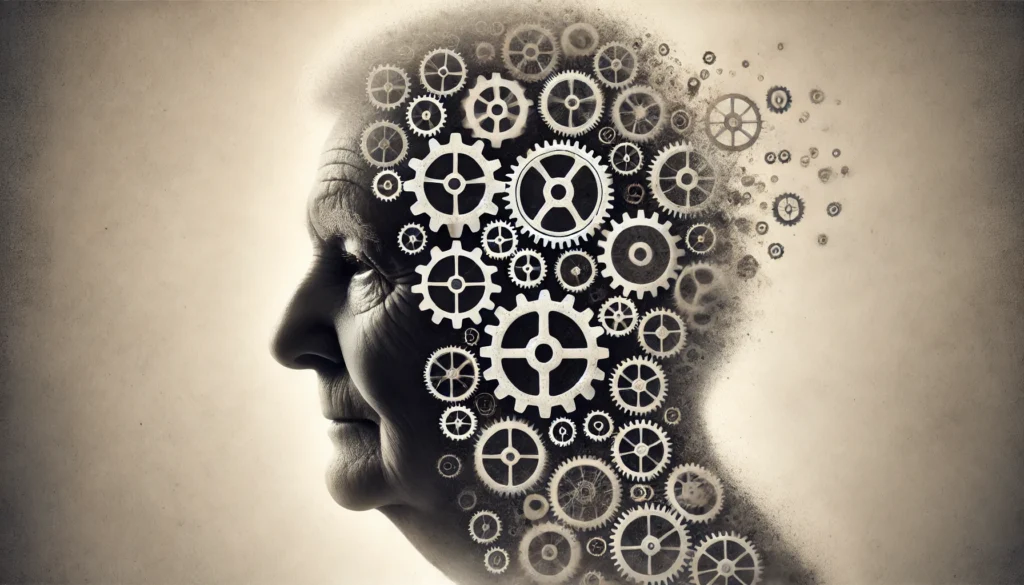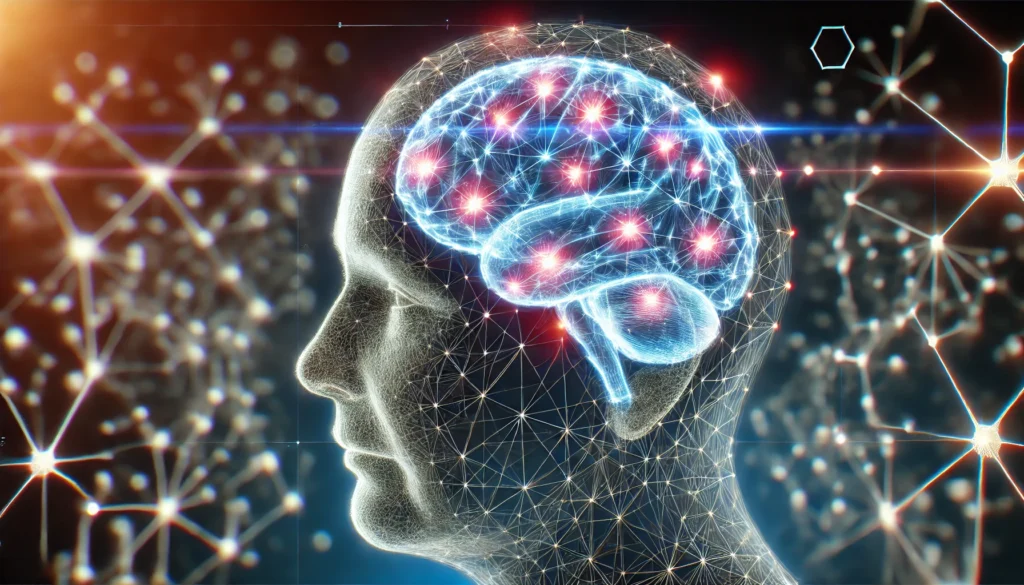The phenomenon of cognitive decline in aging adults is a topic of significant interest and concern for many. As we age, changes in cognitive function are inevitable, but understanding these changes can help mitigate their impact on our daily lives. This article aims to explore the intricacies of cognitive decline, distinguishing between what constitutes normal cognitive aging and what may indicate more serious cognitive impairments.
You may also like: Tips to Improve Low Average Memory Performance
The Nature of Cognitive Decline
Cognitive decline encompasses a variety of changes in mental functions that occur as part of the aging process. These changes can affect memory, processing speed, problem-solving abilities, and more. However, not all cognitive changes in late adulthood signify decline; some are simply part of the normal aging process.
Normal Cognitive Aging
Normal cognitive aging refers to the gradual changes in cognitive abilities that occur naturally with age. These changes, while noticeable, do not necessarily impair one’s ability to live a full and productive life. For instance, processing speed may slow down, but this does not equate to a loss of intelligence or competence. It is crucial to differentiate between changes that are mere inconveniences and those that impact daily functionality.
Moreover, the brain remains adaptable and capable of learning new skills throughout life. This plasticity allows older adults to compensate for slower processing speeds by leveraging experience and knowledge. Emphasizing lifelong learning and mental engagement can help maintain cognitive vitality.
Differentiating From Pathological Decline
Pathological cognitive decline involves more severe impairments that significantly disrupt daily activities. Conditions such as Alzheimer’s disease and other forms of dementia fall into this category. Identifying the early signs of these conditions is crucial for management and intervention. Early symptoms might include significant memory loss, confusion, and difficulty with familiar tasks.
Timely diagnosis can lead to interventions that slow the progression of disease and improve quality of life. Understanding the risk factors, such as family history or previous head injuries, can also aid in early detection. Engaging with healthcare professionals for regular cognitive assessments is a proactive approach to managing cognitive health.
Emotional and Psychological Impact
The prospect of cognitive decline can evoke fear and anxiety, impacting mental health. The stigma associated with cognitive impairments may lead individuals to hide symptoms or avoid seeking help. Encouraging open conversations about cognitive health can alleviate these fears and promote early intervention.
It’s important to recognize that emotional well-being can influence cognitive function. Stress and depression can exacerbate cognitive decline, making mental health support an integral part of managing aging. Providing resources and support for mental health can improve overall cognitive outcomes.
Cognitive Changes in Late Adulthood
As adults transition into late adulthood, several cognitive changes become evident. Understanding which cognitive abilities decline during adulthood can help in identifying normal versus concerning patterns.

Memory
Memory is one of the most commonly discussed cognitive functions that decline with age. While short-term memory may suffer, long-term memory often remains intact. This means older adults might struggle to remember recent events or new information, but they can recall past experiences with clarity. This distinction between short-term and long-term memory is vital for understanding cognitive aging.
Memory aids and strategies, such as note-taking or using calendars, can help manage everyday tasks and reduce frustration. Additionally, engaging in memory-boosting activities, like mnemonic devices or storytelling, can enhance memory retention and recall abilities. Social activities and discussions can also stimulate memory by encouraging the recall of shared experiences.
Processing Speed
Processing speed tends to decrease with age, which affects how quickly individuals can perform cognitive tasks. This slowdown can impact daily activities but is not indicative of a loss of cognitive ability. Older adults may need more time to process information, leading to a need for patience and understanding from others.
Adapting environments to accommodate slower processing speeds can improve quality of life. For instance, simplifying tasks or reducing distractions can help individuals focus better. Encouraging a pace that suits the individual’s comfort level can maintain confidence and independence.
Problem-Solving and Executive Function
Executive functions, including problem-solving, planning, and multitasking, may also show some decline. However, with continued mental stimulation and adaptation, older adults can maintain these skills to a large extent. Engaging in activities that challenge the brain, such as puzzles or strategic games, can enhance executive functions.
Structured routines and organizational tools, like planners or digital apps, can assist in managing daily tasks efficiently. Encouraging older adults to break complex tasks into manageable steps can reduce the cognitive load. Social support and collaboration in problem-solving can also provide cognitive stimulation and foster a sense of accomplishment.
Factors Affecting Cognitive Function in Aging
Cognitive function is influenced by a myriad of factors, both intrinsic and extrinsic. Recognizing these can help in promoting cognitive health in aging adults.
Biological Factors
Genetics play a role in determining how cognitive functions change with age. Some individuals may have a genetic predisposition to certain cognitive disorders, which can accelerate decline. Understanding one’s genetic background can inform personalized strategies for maintaining cognitive health.
In addition to genetics, hormonal changes and chronic health conditions like diabetes or cardiovascular disease can impact cognitive function. Regular medical check-ups and managing these conditions are essential for preserving cognitive abilities. Collaborating with healthcare providers to monitor and address these biological factors can lead to better cognitive outcomes.
Lifestyle and Environmental Factors
Lifestyle choices such as diet, exercise, and mental engagement significantly impact cognitive health. A balanced diet rich in antioxidants, regular physical activity, and mental exercises like puzzles or learning new skills can help maintain cognitive function. These lifestyle factors are within an individual’s control, offering empowerment in managing cognitive health.
Creating a stimulating environment with opportunities for learning and exploration can enhance cognitive vitality. This might include hobbies, travel, or volunteer work that challenge the brain and provide social interaction. Encouraging lifelong learning and curiosity can lead to continued cognitive growth and satisfaction.
Social Engagement
Social interactions and maintaining relationships have been shown to have a protective effect against cognitive decline. Engaging with friends, family, and community activities can provide mental stimulation and emotional support. Social engagement offers opportunities for communication, empathy, and shared experiences, all of which benefit cognitive health.
Participating in group activities or community events fosters a sense of belonging and purpose. Volunteering or joining clubs can expand social networks and introduce new perspectives. Regular social interaction can also alleviate feelings of loneliness, which can negatively impact cognitive and emotional well-being.

Strategies to Mitigate Cognitive Decline
While cognitive decline is a natural part of aging, there are strategies that can help mitigate its impact and promote brain health.
Cognitive Training
Engaging in cognitive training exercises can help maintain and even improve certain cognitive functions. Activities such as memory games, puzzles, and learning new languages or skills can provide the brain with the necessary stimulation to stay active and sharp. Tailoring these activities to individual interests can enhance motivation and enjoyment.
Structured cognitive training programs, available through community centers or online platforms, can offer guided exercises and track progress. Incorporating technology, like brain-training apps, can make cognitive exercises accessible and engaging. Consistent practice and gradual increases in difficulty can lead to measurable improvements in cognitive abilities.
Physical Exercise
Regular physical activity has been linked to improved cognitive function and a reduced risk of cognitive decline. Exercise increases blood flow to the brain and promotes the growth of new neurons, which are crucial for maintaining cognitive health. Finding enjoyable forms of exercise, such as walking, swimming, or dance, can encourage consistency.
Combining aerobic exercises with strength training can provide comprehensive benefits for physical and cognitive health. Group exercise classes can add a social component, enhancing motivation and enjoyment. Setting realistic fitness goals and celebrating achievements can sustain long-term commitment to an active lifestyle.
Nutrition
A diet rich in fruits, vegetables, whole grains, and lean proteins can support brain health. Omega-3 fatty acids, found in fish, and antioxidants, found in berries, are particularly beneficial for cognitive function. Adopting a Mediterranean or DASH diet can provide a framework for healthy eating.
Hydration is also essential for cognitive function, as even mild dehydration can impair concentration and memory. Planning balanced meals and snacks can ensure consistent nutrient intake throughout the day. Consulting with a nutritionist can provide personalized guidance for optimizing diet for cognitive health.
Sleep and Stress Management
Quality sleep is essential for cognitive function. Ensuring adequate rest and managing stress through techniques such as meditation or yoga can help maintain mental clarity and focus. Creating a calming bedtime routine and optimizing the sleep environment can improve sleep quality.
Mindfulness practices, like meditation or deep breathing, can reduce stress and enhance cognitive resilience. Regular relaxation and stress-reduction practices can improve mood and cognitive performance. Integrating stress management into daily routines can foster a balanced approach to mental and emotional well-being.
Future Implications and Research
The field of cognitive aging is constantly evolving, with ongoing research aimed at better understanding the mechanisms of cognitive decline and developing interventions to combat it.
Advances in Research
Recent studies have focused on the role of neuroplasticity in aging. Neuroplasticity refers to the brain’s ability to reorganize itself by forming new neural connections. Understanding how this process is affected by aging could lead to breakthroughs in preventing or delaying cognitive decline. Investigating the factors that enhance neuroplasticity, such as exercise and cognitive training, is a key area of research.
Furthermore, research into the gut-brain axis is uncovering the impact of gut health on cognitive function. The microbiome’s influence on the brain suggests new avenues for dietary and probiotic interventions. Continued exploration of these connections could revolutionize approaches to cognitive health.
Potential Interventions
Research into nootropics and other cognitive-enhancing supplements is gaining momentum. These substances aim to boost cognitive function and protect against age-related decline, offering potential solutions for maintaining mental sharpness in later years. The efficacy and safety of these supplements are subjects of ongoing investigation.
Pharmaceutical advancements, including drugs targeting amyloid plaques and tau proteins, hold promise for treating Alzheimer’s disease. Innovative therapies, such as gene therapy and stem cell research, are also being explored. Collaborations between researchers, clinicians, and industry partners are crucial for translating discoveries into practical treatments.

Conclusion
Cognitive decline in aging adults is a complex and multifaceted issue that affects many aspects of life. By understanding the nature of cognitive changes, identifying risk factors, and implementing strategies to promote cognitive health, it is possible to mitigate the effects of aging on the brain. Staying informed about the latest research and advancements in this field will empower individuals to make choices that support their cognitive well-being throughout life. Embracing a proactive approach to cognitive health can lead to a fulfilling and engaged life, regardless of age.
Further Reading:
How memory and thinking ability change with age
Important Note: The information contained in this article is for general informational purposes only, and should not be construed as health or medical advice, nor is it intended to diagnose, prevent, treat, or cure any disease or health condition. Before embarking on any diet, fitness regimen, or program of nutritional supplementation, it is advisable to consult your healthcare professional in order to determine its safety and probable efficacy in terms of your individual state of health.
Regarding Nutritional Supplements Or Other Non-Prescription Health Products: If any nutritional supplements or other non-prescription health products are mentioned in the foregoing article, any claims or statements made about them have not been evaluated by the U.S. Food and Drug Administration, and such nutritional supplements or other health products are not intended to diagnose, treat, cure, or prevent any disease.


